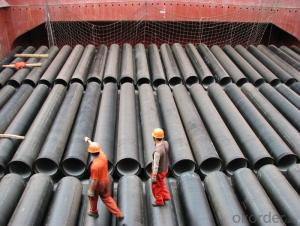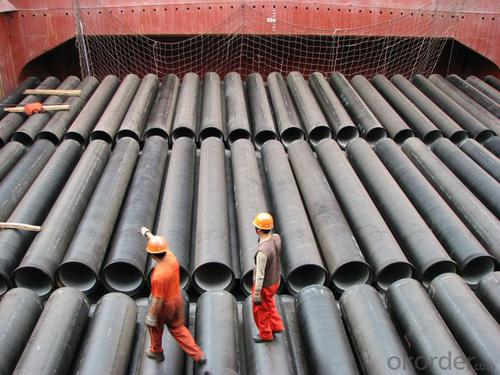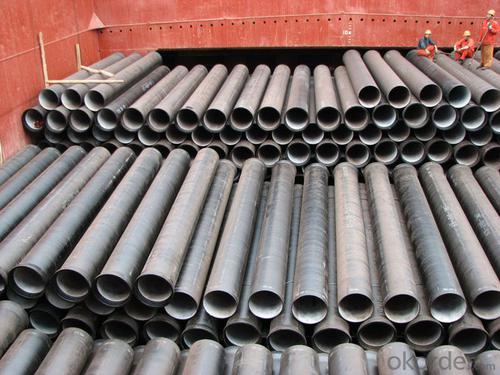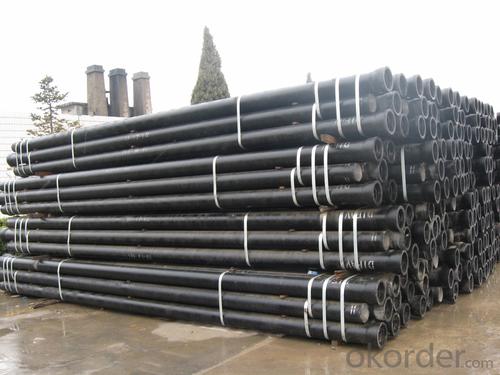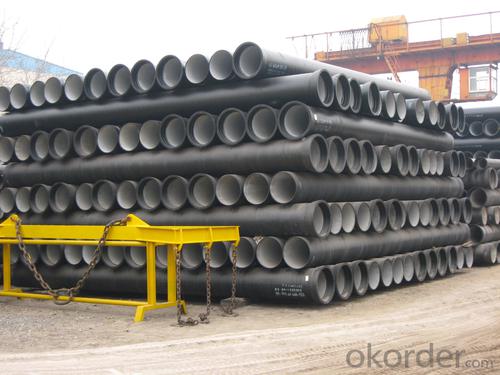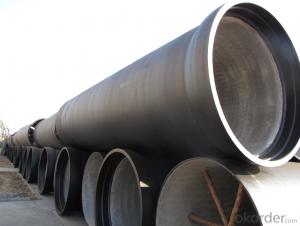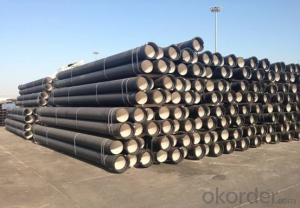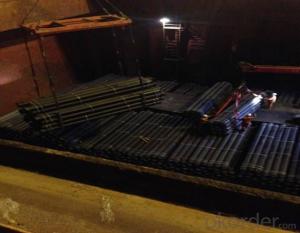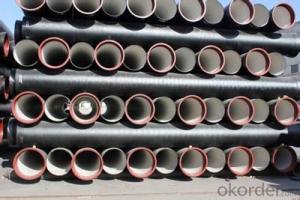DUCTILE IRON PIPE DN125 K8
- Loading Port:
- China Main Port
- Payment Terms:
- TT or LC
- Min Order Qty:
- 20 m.t.
- Supply Capability:
- -
OKorder Service Pledge
OKorder Financial Service
You Might Also Like
Specification:
1) The standard of pipe: ISO2531:1998, K9
2) Effective length: 6m
3) Inner cement line: Portland cement line as per ISO4179
4) Zinc coating: at least 130g/m2 as per ISO8179
5) Bitumen painting: at least 70um as per ISO8179
6) With 100% quantity of NBR ring, or SBR ring, or EPDM ring as per ISO4633
7) DN80mm-800mm
8) High strength, lighter than grey iron, good corrosion resistance, no furring, small flow resistance, easy fixing, long life tome about 100 yeas
9) Produced by Hangzhou chunfeng machine
10) Checked by automatic inspection equipment
11) Composition:
Chemical composition | ||||||
Chemical composition | Ductile Cast Iron Pipe (%) | Grey iron pipe (%) | Steel pipe (%) | |||
C | 3.5-4.0 | 3.2-3.8 | 0.1-0.2 | |||
Si | 1.9-2.6 | 1.4-2.2 | 0.15-0.4 | |||
Mn | 0.15-0.45 | 0.4-0.6 | 0.3-0.6 | |||
P | ≤0.06 | ≤0.3 | 0.02-0.03 | |||
S | ≤0.02 | ≤0.1 | 0.02-0.03 | |||
Mg | 0.03-0.06 | |||||
12) Feature:
Mechanical properties | ||||||
Ductile Cast Iron Pipe | Grey Iron Pipe | Steel Pipe | ||||
Tensile Strength(Mpa) | ≥420 | 150-260 | ≥400 | |||
Yield Strength(Mpa) | ≥300 | No Confirmation | No Confirmation | |||
Bending Strength(Mpa) | ≥590 | 200-360 | ≥400 | |||
Elongation (%) | ≥10 | Neglected | ≥18 | |||
Brinell Hardness(HBS) | ≤230 | ≤230 | About 140 | |||
13) T type mechanical joint
14) Packing: in bulk or container
15) Additional : Ductile iron pipe fittings accoding t ISO2531/EN545/EN598
Gate valve according to DIN standard, BS Standard
Other accessories related to Water field
- Q: Are ductile iron pipes suitable for trenchless pipe ramming installations?
- Yes, ductile iron pipes are suitable for trenchless pipe ramming installations. They possess the necessary strength and flexibility to withstand the impact and vibrations caused during the ramming process. Additionally, their corrosion resistance and durability make them a reliable choice for trenchless installations, ensuring long-term performance and minimal maintenance requirements.
- Q: Are ductile iron pipes suitable for installation in areas with high traffic loads?
- Yes, ductile iron pipes are suitable for installation in areas with high traffic loads. Ductile iron is known for its high strength and durability, making it an ideal choice for applications where there are heavy loads and constant traffic. It has excellent resistance to impact and can withstand heavy loads without cracking or breaking. Additionally, ductile iron pipes have a high load-bearing capacity, allowing them to handle the weight and pressure exerted by vehicles and other heavy equipment. Therefore, they are commonly used in areas such as highways, roads, bridges, and other high traffic areas.
- Q: Can ductile iron pipe be used for irrigation pumping stations?
- Indeed, irrigation pumping stations can utilize ductile iron pipe. This type of pipe finds widespread application, particularly in irrigation systems, owing to its robustness and resilience. Its exceptional tensile strength enables it to endure substantial pressure and weight, rendering it highly suitable for irrigation pumping stations. Furthermore, ductile iron pipe exhibits resistance to corrosion, a desirable trait in the presence of water within irrigation systems. Moreover, its ease of installation and maintenance make it an economical selection for irrigation projects.
- Q: What is the K9 standard pressure for ductile iron pipes?
- The annealed ductile iron pipe is composed of ferrite and pearlite. The mechanical properties of the ductile iron pipe are better. Ductile iron pipes mainly called centrifugal ductile iron pipe, it has the properties of nature, iron and steel, excellent corrosion resistance, good ductility, good sealing effect, simple installation, mainly for municipal, industrial and mining enterprises, water supply, gas, oil etc.. Water supply pipe is the first choice, with high cost performance. Compared with the PE pipe, from the installation time, ductile pipe PE pipe installation is simple and rapid, and after the installation of internal and external pressure bearing better tightness and corrosion resistance; from the point of view, ductile pipe sealing better after installation, but also can improve the corrosion resistance of corrosion protection through a variety of means; from the hydraulic performance, because ductile pipe specifications generally refers to the inner diameter of PE pipe diameter specifications generally refers to the same specifications, because under the condition of ductile pipe can achieve greater runoff; from the installation and maintenance cost, ductile pipe have more favorable price. The main components of ductile iron pipes are carbon, silicon, manganese, sulfur, phosphorus and magnesium. The inner wall of zinc spray, anti-corrosion materials such as cement mortar.
- Q: Do ductile iron pipes require cathodic protection?
- Indeed, cathodic protection is necessary for ductile iron pipes. Employing this technique safeguards metallic structures against corrosion by designating them as the cathode in an electrochemical cell. Ductile iron pipes face a high susceptibility to corrosion, particularly in harsh soil environments or when exposed to water that harbors substantial amounts of corrosive elements like chlorides or sulfates. By subjecting the pipe to a direct electrical current, cathodic protection effectively thwarts the innate corrosion process. This approach guarantees the durability and soundness of the ductile iron pipes, thereby diminishing the frequency of repairs or replacements.
- Q: Can ductile iron pipes be used for geothermal heating and cooling systems?
- Yes, ductile iron pipes can be used for geothermal heating and cooling systems. Ductile iron pipes are known for their strength and durability, making them suitable for underground applications like geothermal systems. They can withstand the high temperatures and pressure variations associated with geothermal heating and cooling, making them a reliable choice for this purpose.
- Q: Can ductile iron pipes be used for water supply in buildings?
- Yes, ductile iron pipes can be used for water supply in buildings. Ductile iron pipes are known for their strength, durability, and corrosion resistance, making them suitable for a variety of applications, including water supply systems. They have a high tensile strength and can withstand high-pressure environments, making them ideal for delivering water to buildings. Additionally, ductile iron pipes have a long service life, reducing the need for frequent replacements. They also have good flow characteristics, allowing for efficient water distribution within the building. Therefore, ductile iron pipes are a reliable and commonly used choice for water supply systems in buildings.
- Q: Are there any special considerations for installing ductile iron pipe in rocky soils?
- Yes, there are several special considerations for installing ductile iron pipe in rocky soils. Firstly, the rocky soil can pose challenges during the excavation process. The presence of rocks can increase the difficulty and time required for trenching. Special excavation equipment may be needed to break through the rocks and create a suitable trench for the pipe installation. Secondly, the rocky soil can cause abrasion and damage to the outer surface of the ductile iron pipe during installation. This can potentially compromise the integrity of the pipe and lead to leaks or breakages in the future. To mitigate this risk, it is recommended to use protective measures such as rock shields or padding around the pipe to minimize direct contact with the rocks. Additionally, the presence of rocks can affect the backfilling process. Proper backfilling is crucial to provide support and stability to the installed pipe. However, rocks can hinder the proper compaction of the backfill material, which may result in uneven support and potential movement of the pipe. It is important to carefully select and place the backfill material, ensuring it is free from larger rocks and adequately compacted to provide sufficient support. Furthermore, the rocky soil may also impact the installation of fittings and joints. The hard rocks can make it challenging to properly align and connect the pipe with fittings or make secure joints. Special care must be taken during the installation process to ensure proper alignment and secure connections, which will prevent leaks and ensure the longevity of the ductile iron pipe system. In conclusion, installing ductile iron pipe in rocky soils requires special considerations to overcome challenges related to excavation, abrasion, backfilling, and fitting installation. By taking these factors into account and implementing appropriate measures, the installation process can be successfully carried out, and the pipe system can function effectively in rocky soil conditions.
- Q: Can ductile iron pipes be used for underground river crossings?
- Yes, ductile iron pipes can be used for underground river crossings. Ductile iron pipes are known for their strength and durability, making them suitable for various applications including underground river crossings. These pipes have a high tensile strength and can withstand the external loads and pressures exerted by the surrounding soil and water. Additionally, they have excellent corrosion resistance, which is crucial when dealing with underground water sources like rivers. Ductile iron pipes are also capable of withstanding ground movements, settling, and other geological challenges that may occur during the installation and operation of underground river crossings. Therefore, they are a reliable choice for ensuring the safe and efficient transportation of water across rivers while maintaining the integrity of the underground infrastructure.
- Q: What pipe can be used to replace the cast iron pipe in the water supply? Thank you
- According to the casting method, it is divided into continuous cast iron pipe and centrifugal cast iron pipe, in which the centrifugal cast iron pipe is divided into sand mould and metal type two kinds. Divided into gray cast iron pipe and nodular cast iron pipe according to different material. According to the interface form, it is divided into flexible interface, flange interface, self anchored interface, rigid interface and so on. Among them, the flexible iron pipes rubber sealing ring; flange interface cast iron pipe flange fixed in the rubber pad, the flange gasket sealing; rigid interface cast iron pipe socket is large, straight pipe is inserted, sealed with cement, this technology has been basically eliminated.
Send your message to us
DUCTILE IRON PIPE DN125 K8
- Loading Port:
- China Main Port
- Payment Terms:
- TT or LC
- Min Order Qty:
- 20 m.t.
- Supply Capability:
- -
OKorder Service Pledge
OKorder Financial Service
Similar products
Hot products
Hot Searches
Related keywords
